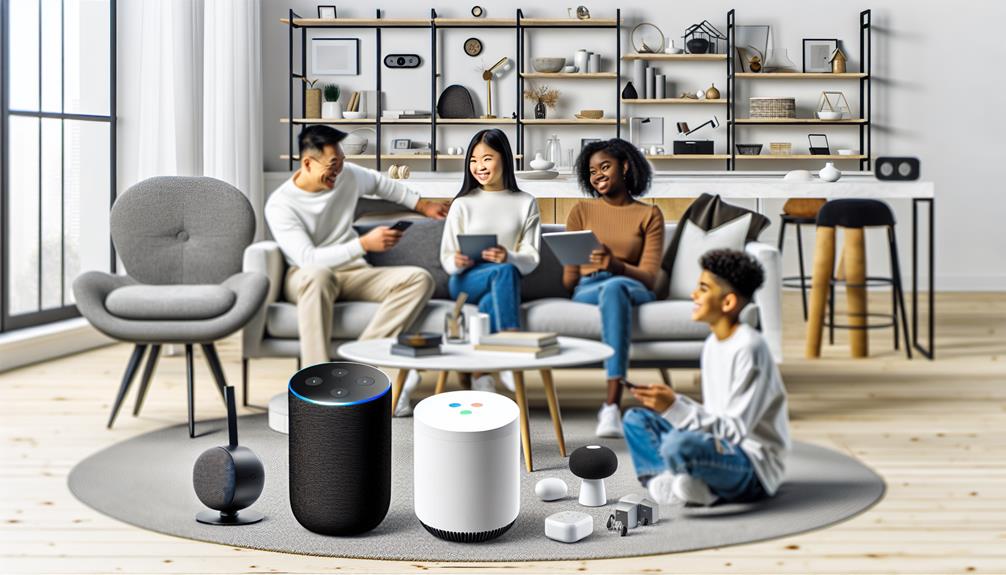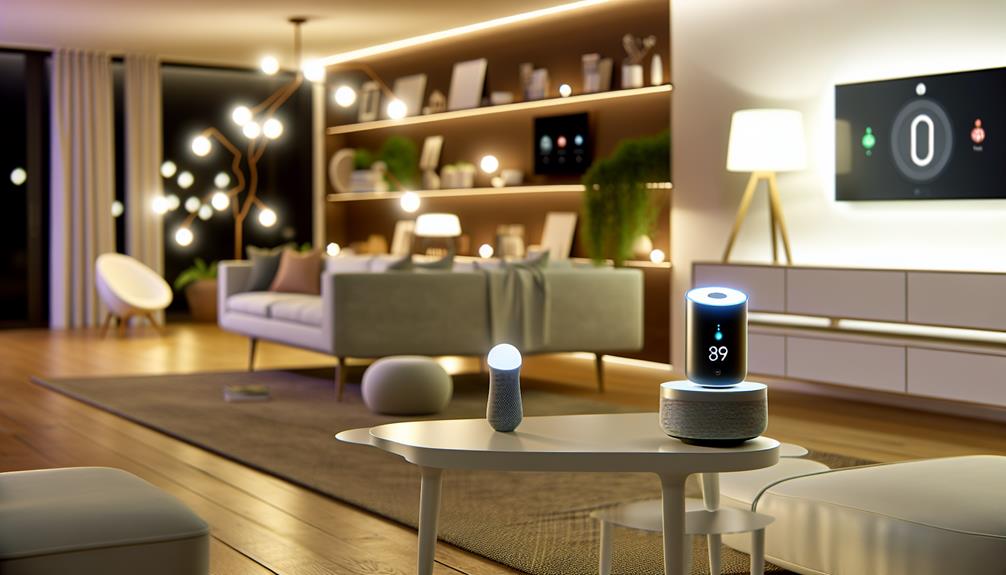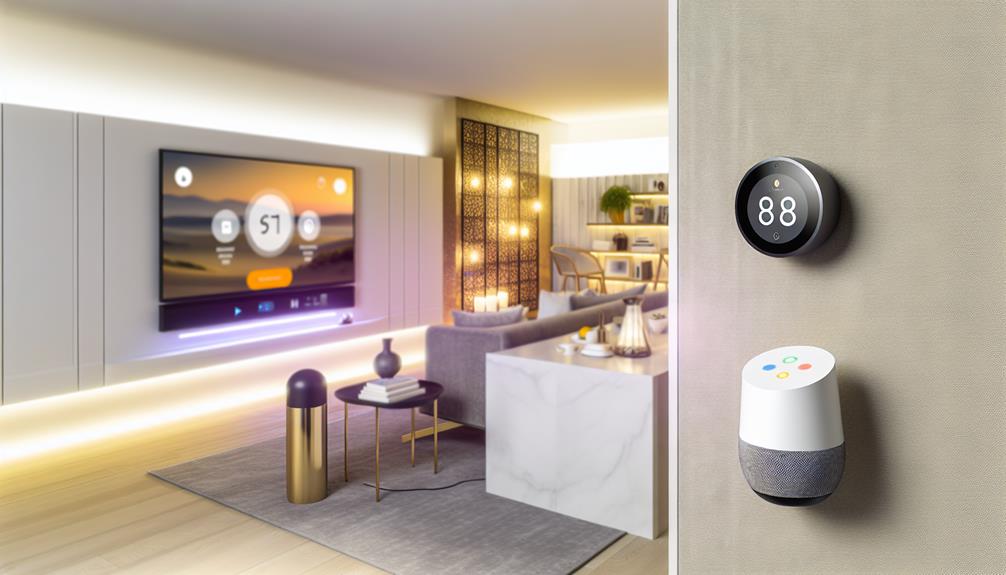Top 10 Benefits of AI Home Assistants
As technology continues to evolve, AI home assistants have emerged as pivotal tools that greatly enhance everyday living. Their capacity to streamline tasks, manage energy consumption, and improve home security presents a compelling case for their integration into modern households. Additionally, these systems offer personalized assistance and seamless connectivity with other smart devices, thereby enriching the user experience. However, the advantages extend beyond mere convenience—there are deeper implications worth considering. What might these benefits mean for the future of home management and personal well-being?
Key takeaways
- AI home assistants streamline daily tasks through effective scheduling, enhancing convenience and productivity in everyday life.
- Voice-activated controls and accessibility features enable hands-free operation, making technology more inclusive for all users.
- Enhanced energy efficiency is achieved through smart thermostats and lighting controls, optimizing consumption and lowering utility bills.
- Advanced home security features provide real-time monitoring and alerts, ensuring peace of mind and protecting against potential threats.
- Continuous learning and personalization allow AI assistants to adapt to individual preferences, improving overall user experience and support.
Enhanced Convenience
AI home assistants have revolutionized daily living by providing unparalleled convenience that seamlessly integrates into our routines. These intelligent devices enhance our everyday life through effective task prioritization and routine scheduling, making it easier for families to coordinate activities and responsibilities.
With features such as daily reminders, users can effortlessly keep track of appointments, deadlines, and important events, fostering a sense of belonging and organization.
Personalized routines are another hallmark of AI home assistants, allowing families to tailor their schedules to fit individual preferences and needs. Whether it's meal planning or shopping assistance, these devices streamline the process, ensuring that meals align with dietary requirements and that grocery lists are efficiently managed.
Additionally, event organization becomes less cumbersome with smart assistants, as they can help manage invitations and logistics.
Beyond household management, AI home assistants also play a significant role in health monitoring and travel management. Users can set reminders for medications, track fitness goals, and even plan trips, ensuring that every aspect of daily life is managed with ease.
Fundamentally, AI home assistants have become indispensable tools for enhancing convenience and fostering a harmonious family environment.
Voice-Activated Control
The integration of voice-activated control in home assistants has greatly enhanced user interaction, further amplifying the convenience they offer. This technology allows users to engage with their devices in a seamless manner, fostering a sense of belonging as it caters to their individual preferences and needs.
With the advancement of voice recognition accuracy, users can expect a high level of responsiveness and precision in commands, allowing for a smoother experience.
User experience design plays a vital role in this functionality. By prioritizing intuitive interfaces and ensuring that voice commands are easily understood, developers enhance the overall interaction between users and their home assistants. This focus on user-centric design not only simplifies tasks—such as setting reminders, controlling smart devices, or accessing information—but also builds trust and confidence in the technology.
Moreover, voice-activated control bridges communication gaps, making technology accessible to individuals of all ages and backgrounds. As families gather around their home assistants, they participate in a shared experience that strengthens their connections.
Ultimately, the combination of voice recognition accuracy and thoughtful user experience design creates a harmonious environment, where technology truly feels like a part of the home.
Energy Efficiency
AI home assistants play a pivotal role in enhancing energy efficiency within households.
By integrating smart thermostats, monitoring energy usage, and automating lighting control, these systems optimize energy consumption while reducing costs.
This innovative technology not only contributes to a sustainable environment but also empowers homeowners to make informed energy decisions.
Smart Thermostat Integration
By integrating smart thermostats with home AI assistants, homeowners can considerably enhance energy efficiency in their living spaces. This synergy allows for dynamic adjustments based on personal climate preferences and smart scheduling, ensuring comfort while minimizing energy waste.
The benefits of this integration can be summarized as follows:
- Automated Adjustments: Smart thermostats learn your routines, adjusting temperatures automatically based on your schedule.
- Personalized Climate Settings: Homeowners can set specific climate preferences for different rooms, creating a comfortable environment tailored to individual needs.
- Remote Control: With AI assistants, you can manage your thermostat from anywhere, providing flexibility while ensuring peak energy use.
- Energy Savings Insights: The AI can analyze usage patterns, offering suggestions for further energy savings and enhancing overall efficiency.
Energy Usage Monitoring
Energy usage monitoring serves as an essential component in the pursuit of enhanced energy efficiency within smart homes. By leveraging AI home assistants, homeowners can gain valuable insights into their energy consumption patterns, allowing them to make informed decisions that promote sustainability and reduce costs.
These systems continuously track and analyze energy usage, providing users with detailed reports that highlight peak consumption times and identify inefficiencies. Through usage trend analysis, homeowners can recognize patterns in their energy consumption, empowering them to adjust habits and optimize appliance use accordingly. For example, they might discover that certain devices consume more power during specific hours, prompting them to shift usage to off-peak times.
Furthermore, this data-driven approach fosters a sense of community among users who prioritize energy conservation. By sharing insights and strategies, homeowners can create a supportive environment that encourages collective action toward sustainability goals.
Fundamentally, energy usage monitoring not only enhances individual energy efficiency but also cultivates a collective ethos of responsible living, reinforcing the importance of conscious consumption in today's interconnected world. Embracing this technology ultimately leads to a more sustainable future for all.
Automated Lighting Control
Imagine walking into a room and having the lights automatically adjust to your presence and preferences. This is the magic of automated lighting control, a feature that enhances energy efficiency while transforming your living environment.
By utilizing AI home assistants, you can enjoy a seamless blend of comfort and functionality.
Automated lighting control offers several advantages, including:
- Ambient Lighting: Automatically adjusts light levels to create the perfect atmosphere.
- User Preferences: Personalize your experience with customizable lighting presets and color temperature settings.
- Smart Scheduling: Set automated routines to turn lights on or off based on your daily activities, optimizing energy usage.
- Mood Enhancement: Scene setting capabilities allow you to enhance your environment for relaxation, productivity, or entertainment.
These features not only contribute to energy savings but also aid in room optimization, ensuring every space serves its intended purpose.
With automated lighting, you can enjoy a home that responds to your needs, fostering a sense of belonging while promoting sustainability.
Embrace the future of living with smart lighting solutions that elevate both your home and lifestyle.
Home Security Improvements
AI home assistants markedly enhance home security through advanced surveillance features, allowing for real-time monitoring and quick access to camera feeds.
Their remote monitoring capabilities empower homeowners to keep an eye on their property from anywhere, providing peace of mind.
Additionally, smart alert systems notify users of unusual activities, ensuring timely responses to potential security threats.
Enhanced Surveillance Features
Home security has reached new heights with the introduction of enhanced surveillance features in modern home assistant systems. These advancements not only bolster safety but also foster a sense of community and belonging among users.
With features such as facial recognition and data encryption, homeowners can enjoy peace of mind while addressing privacy concerns.
Key benefits of enhanced surveillance features include:
- User Authentication: Guarantees that only authorized individuals can access surveillance feeds.
- Emergency Response Integration: Automatically alerts local authorities in case of suspicious activity.
- Alert Notifications: Provides real-time updates on any unusual occurrences, keeping homeowners informed.
- Incident Reporting: Simplifies the process of documenting and reporting events for insurance or legal purposes.
Additionally, parental controls can be implemented to monitor children's activities, while video storage options allow for easy access to recorded footage.
Enhanced surveillance features not only enhance security but also create a supportive environment where families feel safe and connected.
With these tools at their disposal, users can take proactive measures to protect their homes and loved ones, guaranteeing a nurturing atmosphere for everyone.
Remote Monitoring Capability
Many homeowners appreciate the advantages of remote monitoring capabilities, which have revolutionized home security. By enabling remote access to security systems, homeowners can receive real-time updates on their property's status, enhancing peace of mind. These AI home assistants provide a user-friendly interface that streamlines system customization and guarantees device compatibility across various platforms.
The integration of data analytics allows users to identify patterns and potential vulnerabilities, while robust security protocols safeguard user privacy. Alert notifications keep homeowners informed of any unusual activities, guaranteeing timely responses to potential threats. However, it is essential to take into account potential connectivity issues that may arise, which could impact the reliability of remote monitoring.
| Feature | Benefits | Considerations |
|---|---|---|
| Remote Access | Monitor your home from anywhere | Requires stable internet |
| Real-time Updates | Immediate alerts for security | May generate false alarms |
| User Privacy | Guarantees data protection | Must configure settings carefully |
With these advancements, remote monitoring capabilities not only enhance security but also foster a sense of belonging, allowing homeowners to feel more connected to their living environment.
Smart Alerts System
Enhancements in remote monitoring capabilities have paved the way for the implementation of smart alert systems, greatly improving home security. These systems leverage AI technology to deliver real-time updates, ensuring homeowners feel safer and more connected to their environment.
With smart notifications and proactive alerts, residents can stay informed about potential security threats, enabling them to take swift action when necessary.
The benefits of a smart alert system include:
- Real-Time Alerts: Receive immediate notifications for unusual activity or breaches.
- Customized Settings: Tailor alerts based on personal preferences and home layout.
- Integration with Other Devices: Seamlessly connect with cameras, locks, and other security devices for thorough monitoring.
- Remote Access: Manage alerts and security settings from anywhere, fostering peace of mind.
Incorporating these advanced features into home security systems creates a more responsive and interactive experience.
Homeowners can engage with their environment more intuitively, cultivating a sense of belonging and safety. By embracing smart alert systems, individuals enhance not only their security but also their connection to their homes and communities.
Personalized Assistance
AI home assistants offer tailored support that adapts to individual user preferences and routines. By leveraging contextual understanding, these devices can learn about users' habits, enabling them to deliver personalized assistance that enhances daily life. Whether it's managing schedules, setting reminders, or controlling smart home devices, AI home assistants create a sense of belonging by allowing users to feel uniquely understood.
The following table illustrates how user preferences can shape the functionality of AI home assistants:
| User Preference | AI Assistant Response |
|---|---|
| Morning Routine | Adjusts lighting and coffee maker at a set time |
| Music Preferences | Plays favorite playlists or genres based on time of day |
| Family Notifications | Sends reminders for family events or updates on schedules |
Through continuous learning, AI home assistants become increasingly adept at recognizing user preferences, ensuring that support is not just functional but also meaningful. This personalized approach fosters a deeper connection, making technology feel more like an integral part of the home rather than just a tool. As users embrace this tailored assistance, they can cultivate a more harmonious and organized living environment.
Seamless Integration
Building on the personalized assistance that AI home assistants provide, seamless integration into existing home ecosystems is another significant advantage. This capability not only enhances user experience but also fosters a sense of belonging within a connected environment.
When considering smart home interoperability and device compatibility, AI home assistants excel by effortlessly connecting with various devices and platforms.
Here are four key benefits of seamless integration:
- Enhanced User Experience: AI home assistants streamline operations, allowing users to control multiple devices through a single interface.
- Greater Device Compatibility: They support a wide range of devices, making it easier for users to build a cohesive smart home ecosystem.
- Simplified Automation: Users can create custom routines that trigger actions across different devices, enhancing convenience and efficiency.
- Future-Proofing: As new devices enter the market, AI home assistants can adapt, ensuring ongoing compatibility and functionality.
Ultimately, the seamless integration offered by AI home assistants not only simplifies daily routines but also enriches the home environment, fostering a deeper connection among family members and their smart devices.
Time Management
In today's fast-paced world, effective time management is crucial to maximizing productivity and maintaining a healthy work-life balance. AI home assistants serve as invaluable allies in this endeavor, employing task prioritization strategies that cater to individual needs and preferences. By analyzing your schedule and identifying urgent tasks, these assistants help you focus on what truly matters, reducing the stress of overwhelming to-do lists.
One of the key features of AI home assistants is their ability to utilize scheduling automation tools. These tools streamline the process of organizing your day, allowing for seamless integration of appointments, reminders, and deadlines. By automatically adjusting your schedule based on real-time data, such as traffic conditions or changes in priorities, AI home assistants guarantee that you make the most efficient use of your time.
Furthermore, these smart devices foster a sense of belonging by providing personalized recommendations and support tailored to your lifestyle.
Ultimately, embracing AI home assistants for time management not only enhances productivity but also nurtures a healthier balance between personal and professional commitments, fostering a more fulfilling life.
Accessibility Features
AI home assistants offer significant accessibility features that enhance user experience for individuals with varying needs.
Voice activation allows for hands-free operation, making technology more approachable for those with mobility challenges.
Additionally, customizable accessibility settings empower users to tailor their interactions, ensuring that everyone can benefit from these innovative tools.
Voice Activation Convenience
Voice activation technology has revolutionized the way individuals interact with their home environments, particularly enhancing accessibility for those with mobility challenges or other disabilities. This innovation not only improves user experience but also fosters a sense of belonging by allowing users to engage with their surroundings effortlessly.
Key benefits of voice activation convenience include:
- Hands-free operation: Users can control devices without needing physical interaction, reducing accessibility challenges.
- Voice recognition: Advanced systems can identify individual voices, providing tailored responses and enhancing personalization.
- Multi-device compatibility: Voice assistants seamlessly integrate with various smart home devices, creating a unified user interface.
- Language support: Many AI home assistants offer diverse language options, ensuring inclusivity for users from different backgrounds.
While there are benefits, users should remain vigilant about privacy concerns, as voice data can be sensitive.
Additionally, command limitations may exist, requiring users to adapt to specific phrasing for ideal responses.
Customizable Accessibility Settings
Customizable accessibility settings in AI home assistants empower users to tailor their interactions according to individual needs and preferences. These settings guarantee that the user interface is not only functional but also inclusive, allowing users of varying abilities to engage with technology seamlessly.
By offering options such as text size adjustment, voice modulation, and simplified navigation, AI home assistants promote a sense of belonging for users who may face challenges with conventional technology. Users can personalize their experience by selecting features that resonate with their unique user preferences.
For instance, those with visual impairments can benefit from audio cues and high-contrast displays, while users with hearing difficulties may prefer visual alerts or captions. This flexibility fosters an environment where every individual can feel empowered and connected.
Moreover, the ease of customizing accessibility settings enhances user satisfaction, as it provides a sense of control over how they interact with their home environment. As technology continues to evolve, the importance of these features in AI home assistants cannot be overstated, as they serve to bridge the gap between innovation and accessibility, guaranteeing that everyone can enjoy the benefits of smart home technology.
Entertainment Management
Managing entertainment has become considerably more streamlined with the integration of home assistants into our daily lives. These intelligent devices enhance our leisure experiences, allowing families to bond through shared activities and fostering a sense of belonging.
From music recommendations to gaming assistance, home assistants are transforming how we engage with entertainment. Here are some key benefits:
- Personalized Recommendations: Enjoy tailored music recommendations and movie suggestions that cater to your tastes, ensuring everyone finds something they love.
- Efficient Playlist Organization: Effortlessly manage your playlists, making it easy to curate the perfect soundtrack for any occasion.
- Smart Device Compatibility: Seamlessly integrate multiple devices for a cohesive entertainment experience, whether it's streaming a movie or connecting gaming consoles.
- Event Planning and Scheduling: Simplify entertainment scheduling and event planning, allowing you to focus more on creating memorable moments with loved ones.
The result is not just enhanced content discovery and interactive experiences, but also strengthened family bonds through shared enjoyment of diverse entertainment options.
With AI home assistants, entertainment management has never been easier or more enjoyable.
Continuous Learning
A growing number of households are embracing AI home assistants not just for their immediate functionalities, but also for their capacity for continuous learning. This remarkable feature empowers these devices to adapt and evolve based on the unique needs and preferences of their users. Through the application of adaptive algorithms, AI home assistants analyze patterns in user behavior, allowing them to offer increasingly personalized experiences.
User feedback plays an essential role in this learning process. When users interact with their AI assistants, they provide valuable insights that inform the algorithms, enabling the technology to refine its responses and recommendations. This iterative cycle of feedback and adaptation fosters a sense of connection and belonging, as the assistant becomes more attuned to the household's dynamics.
As these AI systems learn and grow, they can anticipate user needs more effectively, transforming mundane tasks into seamless experiences. Whether adjusting the thermostat based on past preferences or curating entertainment options that resonate with family members, the continuous learning capability guarantees that AI home assistants remain relevant and responsive.
Ultimately, this evolution enhances the overall household experience, making technology an integral part of daily life.
Frequently Asked Questions
Can AI Home Assistants Understand Multiple Languages?
AI home assistants exhibit remarkable language processing capabilities, enabling them to comprehend and respond to multiple languages. This multilingual support fosters inclusivity, allowing diverse users to engage seamlessly, enhancing their sense of belonging within their smart environments.
Are AI Home Assistants Compatible With All Smart Home Devices?
AI home assistants generally offer extensive device integration, but compatibility varies among brands and models. Ensuring smart home compatibility requires checking specific requirements to achieve seamless functionality and maximize the benefits of a connected living environment.
How Do AI Home Assistants Protect User Privacy?
Ironically, while AI home assistants aim for seamless interaction, they prioritize user privacy through robust data encryption and stringent user consent protocols, ensuring that personal information remains secure amidst the convenience of modern technology.
Can I Customize My AI Home Assistant's Voice?
Yes, you can customize your AI home assistant's voice through voice personalization features. Many platforms offer various accent options, allowing users to select a voice that resonates with their preferences, enhancing the user experience and fostering connectivity.
What Happens if My AI Home Assistant Loses Internet Connection?
If your AI home assistant loses internet connection, it may exhibit limited offline functionality. To troubleshoot, check your device's settings, restart the assistant, and verify the local network is operational for peak performance and accessibility.



